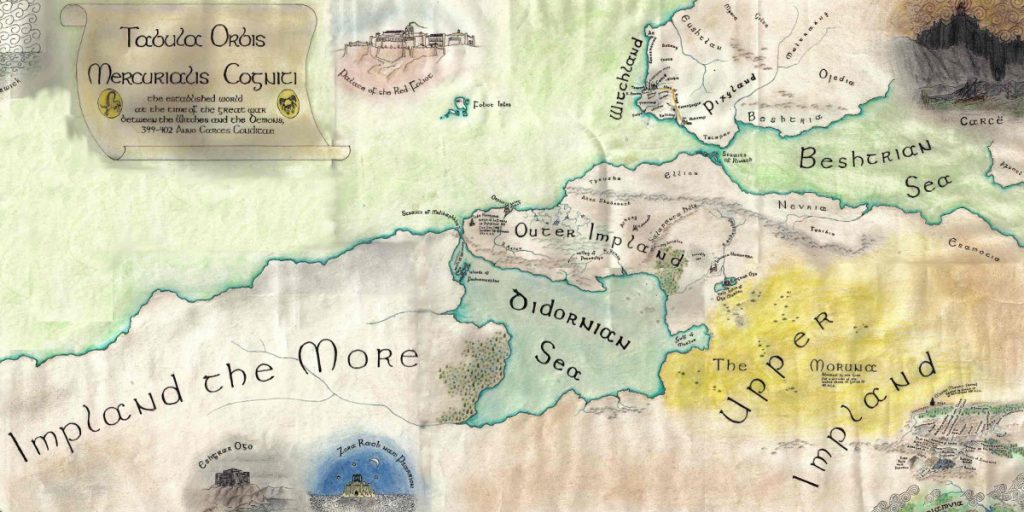In order to help credit students as they begin developing their thesis topics, we have created several course concentrations. These concentrations allow students to focus their degree on areas of interest to them.
Courses in each of these concentrations will be offered during our three 12-week terms each year.
- For a list of current courses, see our course list page.
- For upcoming courses, see the Upcoming Courses page.




TOLKIEN STUDIES

Tolkien courses are available at a number of colleges and universities, but they are mostly limited to an elective class or two. At Signum University, we have created an entire concentration around Tolkien’s works and life.
Why Study Tolkien?
Tolkien was the father of modern fantasy – but he was also much more. His stories emerged from his personal and academic interests, which included a deep love of both language and literature.
Tolkien left behind a wealth of stories, poems, essays, lectures, letters, and notes that scholars have continued to study for decades after his death. New books, monographs, and papers continue to be published to this day on Tolkien’s writings in core areas such as literary analysis, philology, and constructed languages, with applications to topics as diverse as politics, economics, and gender studies.
Tolkien scholarship has begun to expand into new and bigger areas. This is due partly to the popularity of blockbuster movies made from Tolkien’s The Lord of the Rings and The Hobbit. However, it is also due to the growth of online forums where scholars, enthusiasts, and fans (categories that overlap significantly) can come together to discuss their intuitions, ideas, and insights with respect to Tolkien’s works.
View our complete list of courses which count as credit towards this concentration on our Concentrations Course List page.
The Next Step in Tolkien Scholarship
Signum University offers the next step in the evolution of Tolkien studies as a discipline. This concentration in Tolkien Studies is quite possibly the first graduate degree available that allows students to focus primarily on Tolkien’s works and life.
Imaginative Literature

Imagination is a wonderful thing. It allows us to build worlds and create futures, pasts, and alternate presents that can not only entertain and bring release, but can also help us understand our own world all the better.
Why Study Imaginative Literature?
Signum University is leading the way in the study of imaginative literature, including fantasy, science fiction, “weird fiction,” and other speculative stories. This concentration provides students with a solid grounding in a variety of imaginative stories, from myths and legends and pre-Tolkienian fantasy tales to modern sagas with sprawling worlds and technology-filled accounts of future and far-off societies. Imaginative Literature has literally no bounds and has the ability to lead readers (and writers) anywhere that the mind is capable of going.
Much of the literature studied in the courses offered in this concentration have been overlooked at best and at worst maligned by traditional academia. Signum believes that imaginative literature includes some of the greatest – and oldest – stories ever told, showing that imagination is itself an important aspect of human culture and development.
Given the rapid changes occurring within today’s social, political, and cultural spheres, imaginative literature can give us the tools to explore ideas, both new and old, in ways that are otherwise impossible in the mundane world. Imaginative literature allows us to test out diverse philosophies, economic systems, social structures, and other “Big Ideas,” seeing how they could be implemented or adapted to our own situations, writ large or small.
View our complete list of courses which count as credit towards this concentration on our Concentrations Course List page.
Out-of-this-World Scholarship
Signum University offers a whole new way of approaching science fiction, fantasy, and other speculative fiction as a discipline. As part of our degree program, this concentration in Imaginative Literature offers students a great opportunity to study other worlds and ideas and apply them to real-world issues.
Classical, Medieval, and Renaissance Literature

When people think of Literature – in all its important weightiness – they often think of the Renaissance stories by Shakespeare and Milton or older Classical tales like the Odyssey or the Aeneid. The Classical, Medieval, and Renaissance concentration at Signum University gives students an opportunity to examine these popular tales from long ago and decipher why they stand the test of time.
Why Study Classical, Medieval & Renaissance Literature?
More than perhaps any other activity, the telling of stories are what make humans unique from other forms of life. Language allows communication, but stories give us the ability to ruminate on why we’re here, what our purpose is, and how we can improve not only our own lives, but the lives of those around us as well.
Studying stories from long ago gives us the opportunity to see how our forebears lived, thought, and approached the problems in their day. Although we have made many technological changes – some call them advances – since their time, the basic questions of life, relationship, and society have not changed all that much. The answers available to us to meet those questions are, in many cases, the same answers that the storytellers of old had available to them.
At Signum, we do not believe that the stories of one era are inherently better than the stories of another; that said, the passage of time tends to work as a filter by allowing the finest stories to sift down to us. Focusing on the Classical works of Homer or Virgil, the Medieval works of Chaucer or Malory, and the Renaissance works of Shakespeare, among others, allows us to engage with some of the best and brightest minds and consider the ideas those minds produced.
View our complete list of courses which count as credit towards this concentration on our Concentrations Course List page.
Bringing Classic Literature to Online Education
Signum University provides a fresh way of reading and studying the old stories that have become a staple of literature programs the world around. This concentration in Classical, Medieval, and Renaissance Literature breathes new life into a centuries-old discipline.
Germanic Philology

Germanic philology is the comparative and historical study of Germanic languages, modern and ancient and everything in-between. Signum University wants to restore the connection between the study of language and literature that philology once provided.
Why Study Germanic Philology?
According to Dr. Tom Shippey, comparative philology was “one of the breakthrough subjects of the nineteenth century, and for a while had a claim to being the nearest thing the humanities possessed to a hard science.” As a discipline, philology is the study of languages, in particular the relationships between them, as well as their historical development. This is done through the examination and comparison of texts from the earliest times through today.
Germanic philology focuses specifically on the Germanic branch of the Indo-European languages. This includes modern languages such as German, English, Swedish, Dutch, Icelandic, and others, as well as their ancient counterparts such as Anglo-Saxon (i.e., Old English), Old High German, Gothic, Old Norse, and many more. Exploring the connections and common lineages of these languages allows for insights and revelations that otherwise would not be possible.
Philological study also provides a way of looking at literature that has largely fallen out of favor in the modern world. In his 1959 Valedictory Address at Oxford University, J.R.R. Tolkien stated, “The right and natural use of Language includes Literature, just as Literature includes the study of the language of literary works.” Even more than a half century ago, Tolkien lamented the fact that the study of language and literature had been split into separate disciplines. His own creative work grew out of his love of language, and he believed that literature as a whole also grew out of the language in which it is steeped.
View our complete list of courses which count as credit towards this concentration on our Concentrations Course List page.
Making Old Connections New Again
Signum University wants all students to recognize the relationship between language and literature. As part of our degree programs, this concentration in Germanic Philology offers students an opportunity to revive the study of language and literature together.
